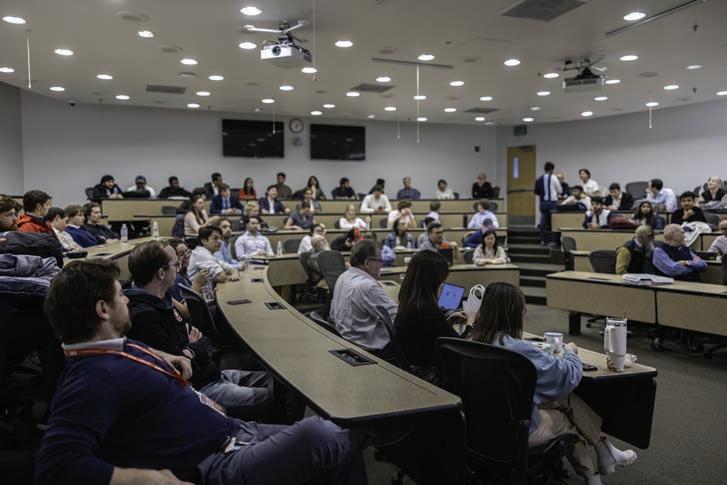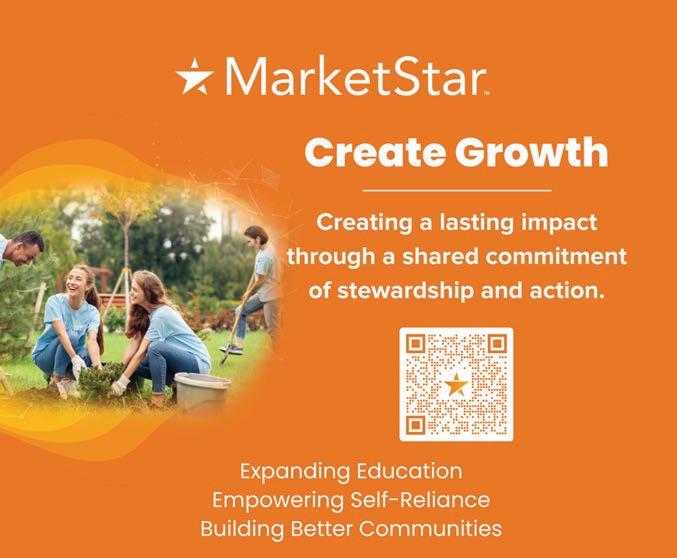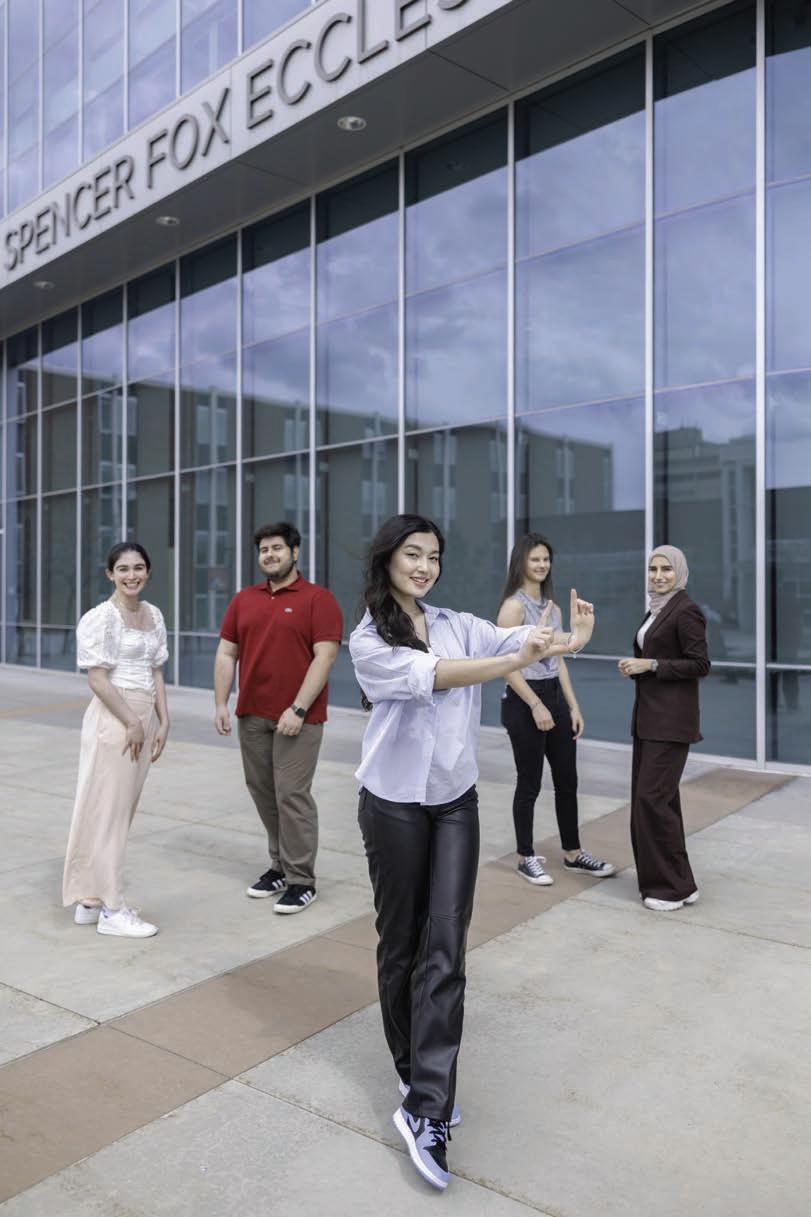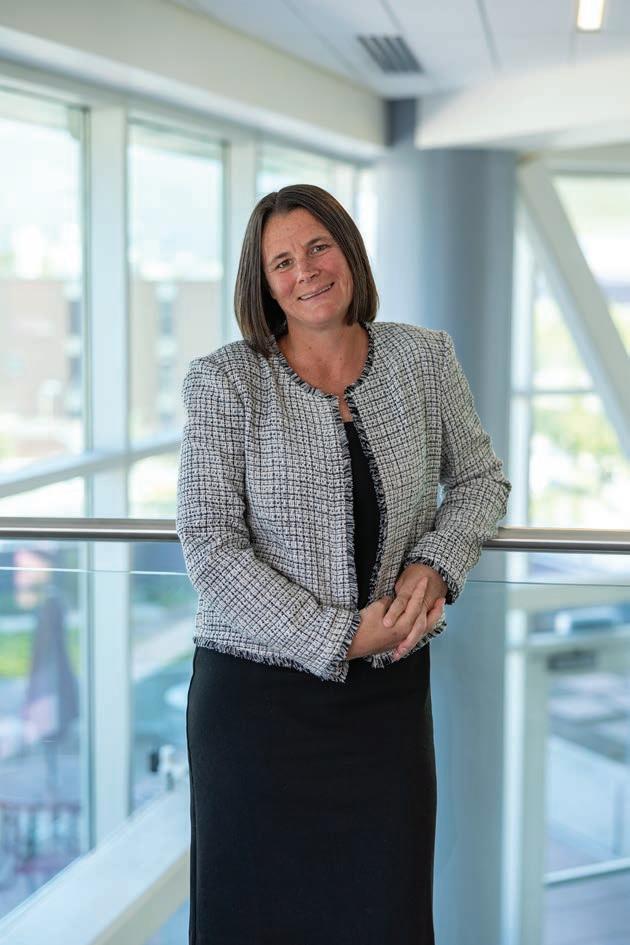
MACHINE LEARNING INDUSTRY ETHIC








From hosting VIP receptions to classes for Executive MBA students, Kahlert Hall in the Robert H. and Katharine B. Garff Building is one of the most versatile and familiar spaces at the David Eccles School of Business – and it has one of the best views to boot. The space is named for Heather Kahlert, who has generously donated time and money to help students strengthen their technical skills and then apply those skills to a business setting. Through the Kahlert Initiative on Technology (KIT), any University of Utah student can earn a certificate in digital literacy through classes, events and activities covering app design, blockchain, virtual reality, artificial intelligence, machine learning, and more.

Do you have a favorite space at the David Eccles School of Business? Email frances.johnson@eccles.utah.edu and let us know where it is and why you love it!


I am so pleased to introduce myself as the new dean of the David Eccles School of Business. If we have not met already, I look forward to meeting you soon.
As a first-generation graduate of a public university, I believe strongly in the role we play in providing a transformative education. Attending college allowed me to pursue a career far beyond what I could have imagined growing up on a family farm in Iowa. I know we can have this same impact on every Eccles student, regardless of their background or circumstance.
The Eccles School is positioned to be the premier educational destination in the Mountain West – and to be one of the best in the country. To live up to that possibility, we have to stay current with the technology and trends that are changing the landscape of higher education, and the job market our alumni will enter. In this issue of the Eccles Experience magazine, we are exploring one of the largest disruptors: Artificial Intelligence, or AI.

Whether you are a student, a recent graduate, a longtime alum or one of our industry or community partners, I am willing to bet AI is a hot topic of conversation. It promises to impact or transform just about every industry – sometimes in ways we don’t fully understand yet.
In the pages that follow, we’ll explore some of those impacts and what they mean for the Eccles School and beyond. You’ll find articles about how AI is changing what we teach and how we teach it; how different industries are deploying AI tools and what that means for the skills new employees need; how we can all be ethical users of AI, and more.
Just as technology moves constantly forward, the Eccles School is also forging ahead, poised for a new era of growth and progress. I look forward to achieving our goals as we work together on behalf of the Eccles School and our students.
Kurt Dirks Dean, David Eccles School of Business
s a fairly new technology, AI's impacts are already being widely felt – and it will only become a bigger part of people’s personal and professional lives going forward. The Spring Eccles Alumni Forum helped paint a picture of the past, present and future of AI with panelists Aaron Davis, Customer Engineer AI/ML at Google; Derek Egan, Product Manager for Vertex AI Google Cloud extensions; and Mat McBride, Corporate Vice President and CFO - Margin Strategy and Optimization at Microsoft. The event was moderated by Justin Spangler, Enterprise Field Sales Representative –Strategic Growth Accounts at Google, and a member of David Eccles Alumni Network Board.
Artificial intelligence, or AI, has evolved quickly, Davis said, starting with the advent of “big data.” For a long time, companies were occupied with collecting as much data as they could, he explained, but at some point they had to figure out what to do with it. In other words, how can you derive value from data? That is the question AI is starting to answer.
And that progress has been accelerated, said McBride, by other technology and hardware breakthroughs such as GPUs (graphics processing units) that can compute large sets of data over a dispersed geographical area.
“We’re going to be sprinting trying to just consume this and find new ways to add new value from the technology,” McBride said. “It’s going to be fascinating to see.”
The key, he added, will be a holistic approach to AI, that includes research, capabilities, and accessibility, such as apps that allow people to easily access AI solutions.
That ecosystem of tools is referred to as an agent, Egan said. Agents will further the mission of creating systems that can act autonomously, and AI will become applicable to most people through agents.
For example, Zebra Technologies, the scanning technology used in most retail stores, deployed an AI agent to index all the training documents and materials frontline retail workers are provided when they onboard to a new position.
All that information – for example, how to process a return – is available through the AI agent in every Zebra device. So, instead of an employee reading through hundreds of pages of processes and then trying


That ecosystem as it comes together I think will really start to transform the way we interact with businesses and each other
to remember the relevant information when they start to process a return, the agent recognizes the task they are trying to complete and provides step-by-step instructions in real time.
And that’s just one example of what AI agents can do.
“That ecosystem as it comes together I think will really start to transform the way we interact with businesses and each other,” Egan said.
According to McBride, companies and individuals have barely scratched the surface of what AI can do. It’s exciting, but it also poses some risks. The technology is outpacing the ability of lawmakers to establish rules that ensure the models are fair, representative, and unbiased so it’s up to companies, he said, to prioritize “responsible AI” and make sure their large data models are not surfacing skewed or incendiary data.
One solution is creating open-source models, Egan said. The more people who can contribute data to a model, the better chance it has of being representative.
People also shouldn’t trust everything that comes out of an AI model, Davis said, just like you wouldn’t trust everything that a co-worker or family member says. It’s the “trust but verify” principle. Users should make sure they can understand how the model got to the output, Davis said. Models can also be “grounded” with a smaller, validated set of data.
As for where AI is going, the panel agreed it is almost impossible to know. Models will continue to evolve and learn rapidly, they said, and use cases will expand as the number of sources for foundational data grows. Reasoning engines will also get better, they speculated, with smaller models targeted at specific use cases, like medical charting, for example, starting to proliferate.
One point of consensus? Wherever AI is going, it’s going there fast. ■


n the healthcare industry, AI has become more than a buzzword, with research dollars for medical devices pivoting from product development to technology, all with the goal of enhancing what practitioners across the industry can do.
“Doctors are a scarce resource in the hospital,” said John Bolinder, Vice President of Operations at Nelson Labs. “This is really a way to focus the effort of the medical practitioner.”
Take medical imaging, for example. It could take a radiologist days or even weeks to analyze images like X-Rays or CT scans and identify patterns, flag anomalies, and build risk profiles. An AI model could do the same amount of work in a matter of minutes or hours, correlating a larger set of inputs and reducing the risk of missed diagnoses.
“The beauty of AI is that you are getting inputs from a variety of sources,” Bolinder said. “It’s almost like seeing 20 specialists at once.”
Similar benefits apply to using AI assistants for medical diagnosis and clinical decision support. The AI tool manages the routine or recurring health support activities like charting and note transcription, while the clinician focuses on the more difficult tasks, making the highest and best use of their time.
For a company like Nelson Labs, which focuses on technology supporting the validation and sterilization of medical devices, there are great benefits to adopting AI said Bolinder, whose role at the company includes business transformation.
One place device companies are focusing AI innovation, he said, is in the area of device cleaning. In 2015, the UCLA medical system reported two deaths related to improper cleaning of endoscopes – a tool used to diagnose and treat diseases of the liver, bile ducts, and pancreas – between patients, exposing them to antibiotic-resistant bacteria. Using borescope images and AI adapted to look for anomalies and patterns inside the scope to detect flaws, cleaning defects, and other issues represents an improvement over the ability of the naked eye to detect non-visible issues.
When it comes to transforming what is possible in the medical field, AI can also play a key role in drug development, Bolinder said, especially for what are known as “orphan drugs” – drugs for rare diseases that affect a small percentage of the population. Development of orphan drugs is usually funded by the government or not at all, Bolinder said, but AI can help make the research and development of these drugs much more affordable by optimizing molecular structures or chemistry techniques that lead to an ideal target-specific drug candidate.
“You don’t have to fail 1,000 times,” Bolinder said. “Now you only have to fail once or twice.”
Bolinder is quick to caution, however, that while AI can assess the safety of a defined structure or a chemical makeup, validating the toxicity and efficacy of a drug candidate remain critical before human drug trials. And human analysis, interpretation, and validation can’t be removed from other AI applications in the healthcare ecosystem either. Bolinder anticipates growth in the field of medical data analytics to keep pace as the role of AI expands.


“ The beauty of AI is that you are getting inputs from a variety of sources... It’s almost like seeing 20 specialists at once.”
“I think we need to be OK with failure, but we need safe failure when it comes to patient care,” Bolinder said. “The ability to analyze the data objectively is going to be really important.”
Bolinder, who defines himself as an early adopter, sees part of his role as coaching people through the possibilities AI presents – what it is and what it isn’t – as well as helping ensure a high level of ethics and acceptable use. Patients need to know how their data is being used, Bolinder said, and they need confidence that their data is being protected.
“It becomes far more personal than finance, or a credit report,” he said, “so we have to be careful about managing people’s health data.”
It will all get easier to do, Bolinder said, as AI matures. It will go through a teenage phase, and a young adult phase, with concerns and kinks being identified and worked out along the way. That adaptation and growth, at least in the healthcare industry, will include developing specific AI solutions to support targeted healthcare, as well as removing bias from existing AI models and incorporating traits from a wider range of groups. If we can ride out the growing pains, though, AI has the possibility to dramatically bring down the cost of healthcare, Bolinder said, thanks to faster diagnosis, better case management, and the highest and best use of the most critical healthcare resource – people.
“AI has a long way to go,” he said. “It’s going to be clunky in the beginning, it’s going to be a little weird, but in 20 to 25 years it will be indispensable. But, we can never turn off our brains when it comes to AI.” ■


srael Chino, currently a student in the Master of Science in Information Systems (MSIS) program at the David Eccles School of Business, sums up his career aspirations this way: to build bridges between robots and people.
So, when the Information Systems department announced their first-ever Generative AI (ChatGPT) Hackathon, Chino jumped at the chance to participate.
Participants were divided into 20 teams of three to four students each, and went into the competition with very little information. All they knew, said Amit Sahu, also an MSIS student at the Eccles School, was that they would get a data set and they could use AI tools such as ChatGPT however they wanted to help extract trends and business solutions from the data. Sahu said he had never used ChatGPT for a technical project and was interested in the chance to learn the technology in a deeper way.
“It was an opportunity to learn something new,” Sahu said. “After that, my outlook has changed. You can just ask AI questions and it will do a lot of work for you.”
But the key to getting the right output, Chino said, is to ask the AI the right kind of questions. Even before he had the competition data set, Chino, who was very familiar with ChatGPT through previous jobs, wrote scripts for a ChatGPT model including the role he wanted the AI to play –that of a data analyst consultant – and how he wanted the results returned – in Python code. That allowed his team to work more quickly once the competition started, he said.
Each team was given a data set that included thousands of lines of text from reviews of a medical clinic. Chino and his team spent about five hours cleaning the data and refining their model with increasingly specific fields and questions. Ultimately, they were able to extract a trend from the data – that customer sentiment regarding the clinic had declined over a two-year period – without having to read all those lines of text individually. Each team presented their final solution to a panel of judges, who evaluated teams based on the quality of their solutions, the professionalism of their materials, the effectiveness of their presentations, and the novelty of their approaches. Judges were also on the lookout for solutions that showcased creativity, innovation, and a deep understanding of the problem at hand.
Getting the right solution from an AI tool, however, requires more than just plugging information into the model, Sahu said. The trick of any AI output is to make sure you can “decode” it. You must be able to understand what the AI tool is giving you – and why. If you can’t make sense of it, it might be wrong, or what the industry calls a “hallucination.”
Though AI will certainly transform many industries, especially in the Information Systems space, Sahu said, that possibility of error will keep human workers essential.


AI will help us do those jobs so we can spend more time with people. It's going to take over, so we need to know how to use it.

Sahu refers to these new AI-enabled, human-centric positions as “technofunctional roles.” Traditionally non-technical people will need to know how to prompt AI tools and interpret the model’s output, while traditionally technical people will need a deeper understanding of business needs, goals, and use cases.
“People need to understand the technology,” he said, “and they need to understand business.”
Chino agrees that “human-centered” jobs can never be completely replaced by AI tools, but AI can be a support to enhance the capabilities of human workers and help them do some parts of their jobs faster, the same way robots did for the manufacturing industry.
“AI will help us do those jobs so we can spend more time with people,” he said. “It’s going to take over, so we need to know how to use it.” ■











By Frances Johnson
Artificial intelligence (AI) is everywhere, including the classroom. But the impact of AI on education has been different from what some people may have expected.
The introduction of AI tools such as ChatGPT raised a lot of concern that students would stop learning – that they would use AI tools to complete all their work, and that teachers and professors would have no way of knowing what was produced by a student and what was produced by a chatbot. However, according to research conducted at the Stanford Graduate School of Education, access to AI tools has not increased the incidence of cheating and the majority of students surveyed said that using a chatbot to write an entire paper or complete an entire assignment should never be allowed.
Rather than making it easier for students to get away with doing and learning less, AI has instead raised the bar for the skills students need to develop – and the responsibility of business educators to deliver them .
“I get some deeply stupid responses from students,” said Jeff Webb, program director for the Master of Business Analytics program at the David Eccles School of Business, referring to AI-generated assignments and tasks.
You cannot, for example, ask an AI tool a question like, “What is my reaction to this video?” and expect to get a useful response, Webb said.
But ask an AI tool a question like, “Please write the first paragraph of an article for an alumni magazine about the impact of AI on business education,” and you get something like this:
“Artificial intelligence is rapidly transforming nearly every industry and business function, making it one of the most disruptive and consequential technologies of our era. This sea change has major implications for how business education must evolve to prepare future leaders and equip them with the skills to navigate an AI-driven economy. Business schools are scrambling to update curricula, enhance coursework on data analytics and machine learning, and ingrain an AI-first mindset across fields like marketing, finance, operations and strategy. The integration of AI into the business school experience—from the classroom to career services to the way degrees are ultimately delivered—is becoming mission-critical for ensuring graduates are ready to make intelligent decisions, manage human-machine workforces, and capitalize on AI's potential.”

“We have to get students away from the junk and get them to use AI as a productive learning tool.”

eventually take over. Matt Pecsok doesn’t buy it. Just because an AI tool can pass a finance exam doesn’t mean you should make it a CFO, he said.
It is true that AI tools can help you do smaller, more repetitive tasks faster, said Pecsok, an assistant professor in the Operations and Information Systems department at the Eccles School. But that doesn’t mean a free pass to do less work, he said. It means you now have the capability to do more and go further.
“Now I can spend more time on those higher-level objectives, which are frankly more important,” Pecsok said.
“We have to get students away from the junk and get them to use AI as a productive learning tool,” Webb said.
In other words, helping students understand how to structure their interactions with AI is now a major part of a business education, and that means critical thinking skills are more crucial than ever, Webb said. Degrees like business analytics have to shift from being all about teaching students how to code, to being more about teaching students to understand business problems and be part of solving them.
“AI should be a real wake-up call,” he said. “We all need to be thinking, ‘What am I adding of value to the workflow that isn’t a rote task?’”
The task for business educators is to ensure that students are prepared to think on that higher level. In the assignments he gives to students, Pecsok has been incorporating more open-ended questions that can’t be answered reliably by an AI tool. He also administers offline tests where students don’t have access to AI.
But there are other times Pecsok encourages students to use AI as a way to expand their thinking and explore their curiosities. If they have a question about something covered in class, Pecsok tells his students, there’s no need to wait for office hours – just ask AI. If students want to apply a concept beyond what was covered in class, AI can help with that, too.
“It’s a real opportunity for students to go beyond and explore the things they are curious about,” Pecsok said. “It lets them think about ideas in a totally new way than they have before.”
That ability to think creatively to solve problems is what will keep human workers from becoming obsolete even as AI continues to evolve –

delivering to students. It takes a human mind to connect with stakeholders, do
and those are the skills business educators need to make sure they are delivering to students. It takes a human mind to connect with stakeholders, understand business requirements, and translate them into a business solution. AI might be able to do 80% of the work, Pecsok said, but the last 20% is the hardest and most important – and it takes people collaborating and thinking together.
“AI cannot be curious,” Pecsok said. “Human curiosity can never be replaced.”
Part of using AI well is also understanding what it is not good at. AI can be biased, for example. It can get the answer wrong and doesn’t verify its work. And it cannot replace academic rigor or individual understanding of concepts, topics, or processes.
That last point is of particular interest – and concern – to Rohit Aggarwal, professor of Operations and Information Systems at the Eccles School.
Together with some collaborators, Aggarwal recently conducted a study to determine the impact of AI on knowledge gain. He took recent college graduates working as developers and divided them into three groups. Each group was given the same task to complete. One group could use ChatGPT without restrictions to help them complete the task. One group had no access to AI tools. And one group was given an AI-generated example of one possible way their task could be completed to use as a guide.
So, which group performed the best? When it came to simple tasks, Aggarwal said, the group with unlimited access to AI did the best. But for more complex tasks, the group with access to an example generated by AI performed better. The more impactful insights, however, came when the researchers measured the knowledge gain of each group.
After several months, it was the group with the AI-generated example that had gained the most knowledge through completion of their task. They had better coding, and better understanding of best practices, Aggarwal said. Meanwhile, the group with total access to AI performed the worst over time and had the least knowledge gain over the course of their task. In fact, the researchers found that the group with unlimited AI access lost confidence in their own skills and rarely questioned the output


they got from AI, instead treating it as an authority figure that didn’t make mistakes.
“This is very alarming,” Aggarwal said, “especially for early learners. That is one of the biggest apprehensions for educators. How do we make sure students don’t lose their ability to think?”
The answer is not to restrict students’ access to AI tools completely, Aggarwal said, but instead to revamp curriculum to help students learn how AI tools can augment their own thinking. AI can be like a buddy you brainstorm with, but you should never give it full control of a task or assignment.
Used correctly, AI can free up time and brain power to focus on larger and more complex business and social problems, creating space for innovation and sustainable solutions. The challenge for students and teachers alike is to prepare for the collaboration and critical thinking skills that AI-enabled classrooms and workplaces demand. The days of being just a coder, for example, are gone, and the days of interdisciplinary, technology-enabled progress are here.
“AI is not a trend. It’s a very versatile tool,” Aggarwal said. “It makes a lot of other things possible.” ■


Helping students learn how to use AI ethically and responsibly will help them make the most of powerful technology without sacrificing their own learning and growth. Carnegie Learning recommends teaching these 10 ethical AI practices to students of any age.
Think critically. No answer from AI should be accepted at face value. Teachers and professors can even tell students they aren’t allowed to use an AI tool like ChatGPT until they’ve learned about a topic in class or from other verified sources.
Use AI as a tool, not a crutch. AI should never replace human critical thinking.
Analyze bias in AI. AI can produce harmful ideas, leave out key information, and perpetuate stereotypes. Help students develop the critical eye they’ll need to spot bias in AI’s output.
Confirm accuracy. A Stanford study found that ChatGPT is getting worse at answering math problems. It has also made up book titles, invented legal cases, and given dangerous medical advice. Make sure students know how to verify the accuracy of AI output with reputable sources.
Be transparent. Students should be upfront about how and when they are using AI – and teachers, professors, and professionals should be, too.
Define cheating. Teachers, professors, and companies will have different standards about what’s acceptable AI usage and what’s cheating. Whatever your position, be clear about your AI policy.
Encourage curiosity. Make sure your students or your employees know it’s OK to ask questions about AI. This technology is new for everyone, and we can all learn together.
Respect privacy and consent. Once information is entered into ChatGPT or other AI tools, it’s no longer private. Helping students understand that will also help them be more wise about what information they share with AI.
Be ethical digital citizens. Remember: how you share, create, or engage with AI-generated content can impact other people, too.
Promote educating others. Empower your students, colleagues, and friends, to share their own ethical AI practices to help educate others. Technology is moving fast, but we are all in this together.
By Annesley Womble
at Microsoft, where he currently works as Corporate Vice President and Chief Financial Officer for Margin Strategy. In this role, McBride is faith and invested in a company called OpenAI in 2019, which was quickly followed by the launch of ChatGPT in 2022.








Suddenly, experts from across the technology field were talking about the historic nature of the investment, and McBride realized he had a front row seat to something truly remarkable. This investment was not only going to revolutionize the workplace, but it had the potential to completely alter human existence. In other words, preliminary results of the investment
The next step, McBride said, is focusing attention and resources on how to use AI responsibly. He defines the term “ Responsible AI ” as “ restricting the capability of AI to positive use, making sure society truly does benefit. ” Microsoft further defines this as “ an approach to developing, assessing, and deploying AI systems in a safe , trustworthy , and ethical way keeping people and their goals at the center of system design decisions and respecting enduring values like fairness, reliability, and transparency.”
AI models are trained on the world’s information . They are limited only by the information they have access to when they are trained. From there, responsible persons and companies apply controls and safety t be weaponized and used in irresponsible ways that may harm society. The biggest challenge facing the technology sector AI is learning faster than policy and protocols can keep up There needs to be a general understanding that this shared responsibility to uphold the ethics of AI falls on everyone involved – policy makers, creators, and users combined.
Companies like Microsoft can also be leaders in this space, McBride said, s learning process to include controls that give space to varying perspectives, experiences, and expertise.
At Microsoft, we think about empowering every person to achieve more, s very much aligned with our mission of how we see technology benefiting human beings now and well into the future, ” McBride said. "That is why Microsoft is working very hard with policymakers to advocate for the pace of policymaking to catch up with innovation itself. ”
Right now, Microsoft is developing responsible AI in two ways.
Firstly, Microsoft has a protocol that monitors and predicts the inherent harm of AI. Together with OpenAI, Microsoft reviews use cases and capabilities, McBride said, so they can establish controls on what a given
and capabilities, so nothing is released that doesn ’ t meet the two companies’ agreed-upon requirements.
Secondly, Microsoft has an undercover task force called the Red Team. These specialists spend their days purposely making AI models do things Microsoft wouldn ’ t want them to do, just like any typical security team would. The Red Team finds vulnerabilities and resolves them quickly.
Implementing similar controls is vital to a company ’ s success while using AI, McBride said, especially when it comes time to “ crawl ” the internet for publicly available data to enhance AI ’ s development. Crawling is typically nothing more than systemically browsing the Internet to collect data from websites that can be used to teach and train AI models. But Microsoft searches a little more intentionally, McBride said. For example, they recently teamed up with Khan Academy, a set of online tools that helps educate students with short video lessons. The Khan Academy partnership introduces Microsoft and OpenAI to unbiased information on all sorts of subjects from around the world to build the most intelligent models.
This open line of communication began when ChatGPT was first introduced and helps ensure regular review of everyday AI functionality
“We’re headed towards the future, and the more human beings that can interact with AI and lean into it... the more we’ll find productive uses for it, and the more it’ll benefit each of us.”
By gaining access to this accredited source, Microsoft is prioritizing the quality of data the company is crawling to mitigate the amount of incorrect information that is being funneled into AI, McBride said.
So how can smaller companies, that don ’ t have an enormous budget to spend on crawling and the newest models of AI, implement this technology and do it responsibly? The first step, McBride said, is to define their own beliefs and values when it comes to the safety and security of their business and customers – and how that relates to their potential use of AI.
Companies of every size also need to agree on what kind of budget they are
considered AI implementation, their competitor has and, further down the road, customers and shareholders will be expecting AI ’ s efficiency and capabilities to deliver the highest value.
Microsoft,
Even for a company the size of Microsoft, these are not always easy questions to answer. When it comes to AI, McBride said, we are all in a phase of curiosity and experimentation. But, he added, that doesn ’ t mean “ wait and see. ” Companies and individual users need to take this learning phase seriously because AI is moving fast. The conversation about responsible AI needs to keep pace , McBride said, so all users can be good

By Frances Johnson
Imagine for a moment that you are planning a family vacation – but you’re not exactly sure where you want to go. You could spend hours researching locations, reading reviews, tracking airfares, and looking into rental cars.
magine for a moment that you are planning a family vacation – but you’re not exactly sure where you want to go. You could spend hours researching locations, reading reviews, tracking airfares, and looking into rental cars.
Or, you could open a travel app and, using an AI interface, type in something like, “I’d like to go to a nice warm beach in the middle of the Utah winter because I am tired of skiing.” Within a matter of minutes, you’d have a list of possible destination recommendations and maybe even some sample itineraries, too.
Or, you could open a travel app and, using an AI interface, type in something like, “I’d like to go to a nice warm beach in the middle of the Utah winter because I am tired of skiing.” Within a matter of minutes, you’d have a list of possible destination recommendations and maybe even some sample itineraries, too.
“The result should be like engaging with an expert travel advisor who has experience with the destinations and activities you’re interested in,” said Thomas Crook, director of AI and machine learning program management at Expedia.
“The result should be like engaging with an expert travel advisor who has experience with the destinations and activities you’re interested in,” said Thomas Crook, director of AI and machine learning program management at Expedia.
Crook’s role includes supporting more than 40 technical teams to provide experiences just like the beach scenario through the Expedia travel apps and websites. From pre-trip planning to post-trip reflection, AI is now available at every stage of travel, he said.
Crook’s role includes supporting more than 40 technical teams to provide experiences just like the beach scenario through the Expedia travel apps and websites. From pre-trip planning to post-trip reflection, AI is now available at every stage of travel, he said.
Now imagine you are a person seeking mental health support, and you’re asked to fill out a self-assessment online or at your provider’s office. Are you always honest in your responses? Do you always even know exactly how you’re feeling?
Now imagine you are a person seeking mental health support, and you’re asked to fill out a self-assessment online or at your provider’s office. Are you always honest in your responses? Do you always even know exactly how you’re feeling?
What if, instead of checking boxes on a piece of paper, you could respond to the self-assessment questions using your phone and an AI-enabled app that records video and audio of your responses and then analyzes your facial expressions and body language in addition to your answers and gives you a score that goes to your care provider and informs an outreach or treatment plan?
What if, instead of checking boxes on a piece of paper, you could respond to the self-assessment questions using your phone and an AI-enabled app that records video and audio of your responses and then analyzes your facial expressions and body language in addition to your answers and gives you a score that goes to your care provider and informs an outreach or treatment plan?
“I believe what will be better is that AI might help us overcome some of the dishonesty we have with ourselves,” said Cameron McBride, CEO of Bloomquist Hale Solutions, a mental health provider that contracts with companies to provide mental health services for their employees and families.
“I believe what will be better is that AI might help us overcome some of the dishonesty we have with ourselves,” said Cameron McBride, CEO of Bloomquist Hale Solutions, a mental health provider that contracts with companies to provide mental health services for their employees and families.
Bloomquist Hale is getting ready to launch just this kind of AI-enabled app and, while it’s difficult to know how people are going to react to it, McBride said, his hope is that it helps get more people into treatment sooner.
Bloomquist Hale is getting ready to launch just this kind of AI-enabled app and, while it’s difficult to know how people are going to react to it, McBride said, his hope is that it helps get more people into treatment sooner.
“People wait until they’re in crisis to reach out to somebody,” he said. “Ideally when you start to see signs of struggle, that’s when a provider can reach out.”
“People wait until they’re in crisis to reach out to somebody,” he said. “Ideally when you start to see signs of struggle, that’s when a provider can reach out.”
Here’s another one.
Here’s another one.
Imagine you are an elderly person living on your own, and AI software in your home security camera system could identify when you had fallen and alert emergency responders. Or that you are a school principal and facial recognition-enabled security cameras around your campus could identify someone not allowed on school grounds and alert law enforcement.
Imagine you are an elderly person living on your own, and AI software in your home security camera system could identify when you had fallen and alert emergency responders. Or that you are a school principal and facial recognition-enabled security cameras around your campus could identify someone not allowed on school grounds and alert law enforcement.
All that and more is happening at Spot AI, a Utah-based company providing AI surveillance camera systems and intelligent video recorders.
All that and more is happening at Spot AI, a Utah-based company providing AI surveillance camera systems and intelligent video recorders.
“This kind of technology is the way of the future,” said Sadia Al-Hilo, a sales representative at Spot AI. “There’s no going backwards from this point. There’s only going forward. The power players will always have powerful technology.”
“This kind of technology is the way of the future,” said Sadia Al-Hilo, a sales representative at Spot AI. “There’s no going backwards from this point. There’s only going forward. The power players will always have powerful technology.”
But there is a catch in all these emerging business applications for AI, said Josh Wyatt, senior vice president of strategic operations and data analytics at MasterControl, which works with companies in the healthcare sector to develop, manufacture, and commercialize products that help people lead healthier, happier lives.
But there is a catch in all these emerging business applications for AI, said Josh Wyatt, senior vice president of strategic operations and data analytics at MasterControl, which works with companies in the healthcare sector to develop, manufacture, and commercialize products that help people lead healthier, happier lives.
DAVI D EC CLE S SCHOO L
The future of AI will be the orchestration of intelligent agents. I think it’s going to be intelligent people orchestrating intelligent machines.”
– Josh
Wyatt Senior Vice President of Strategic Operations and Data Analytics At MasterControl
“Don’t fall in love with the tool. Fall in love with the value it creates,” he said. “The real thing is: what kind of house are you building? I need to create value for the company, I don’t need the latest, shiny thing.”
“The future of AI will be the orchestration of intelligent agents. I think it’s going to be intelligent people orchestrating intelligent machines,” Wyatt said.
“The future of AI will be the orchestration of intelligent agents. I think it’s going to be intelligent people orchestrating intelligent machines,” Wyatt said.
AI models don’t just expand the capabilities of individual employees, they can expand the capabilities of entire companies, too. For example, during the COVID-19 pandemic, Expedia used AI virtual agents to respond to a flood of requests for help with refunds, travel credits, and rebookings.
“Don’t fall in love with the tool. Fall in love with the value it creates,” he said. “The real thing is: what kind of house are you building? I need to create value for the company, I don’t need the latest, shiny thing.”
There is little doubt that AI is creating value for companies in a variety of industries, as repetitive and time-consuming tasks are easily automated, Wyatt added. Here’s yet another example, happening at MasterControl right now: preparing for a sales call.
AI models don’t just expand the capabilities of individual employees, they can expand the capabilities of entire companies, too. For example, during the COVID-19 pandemic, Expedia used AI virtual agents to respond to a flood of requests for help with refunds, travel credits, and rebookings.
“We literally could not have hired enough call center agents to handle the disruption that occurred,” Crook said.
There is little doubt that AI is creating value for companies in a variety of industries, as repetitive and time-consuming tasks are easily automated, Wyatt added. Here’s yet another example, happening at MasterControl right now: preparing for a sales call.
Sales reps would spend a lot of time researching potential customers, trying to understand their business objectives, and finding personal details to make a personal connection. Now a generative AI agent can do all that legwork. But that doesn’t mean a sales rep suddenly has less work, Wyatt said. In fact, it means the opposite. Freed from repetitive, monotonous tasks, employees now need to prove they have the critical thinking and analytical skills to make the most of the information they get from AI tools – and to challenge that information when it’s not quite right.
Sales reps would spend a lot of time researching potential customers, trying to understand their business objectives, and finding personal details to make a personal connection. Now a generative AI agent can do all that legwork. But that doesn’t mean a sales rep suddenly has less work, Wyatt said. In fact, it means the opposite. Freed from repetitive, monotonous tasks, employees now need to prove they have the critical thinking and analytical skills to make the most of the information they get from AI tools – and to challenge that information when it’s not quite right.
“We literally could not have hired enough call center agents to handle the disruption that occurred,” Crook said.
Expedia also uses AI virtual agents to help travelers rebook flights that are disrupted by weather, so they don’t have to wait in long queues to talk to a live agent. AI tools also help Expedia customers find the prices and products that best meet their needs. For example, AI models distill information from tens of thousands of reviews and other sources to present travelers with shortlists and summary descriptions of the best lodging, transportation, and activity options for their trip. Other AI tools predict future prices and send push notifications when prices change to help travelers time their bookings to save money.
Expedia also uses AI virtual agents to help travelers rebook flights that are disrupted by weather, so they don’t have to wait in long queues to talk to a live agent. AI tools also help Expedia customers find the prices and products that best meet their needs. For example, AI models distill information from tens of thousands of reviews and other sources to present travelers with shortlists and summary descriptions of the best lodging, transportation, and activity options for their trip. Other AI tools predict future prices and send push notifications when prices change to help travelers time their bookings to save money.
At Expedia and other AI-friendly organizations, the hope is that increased capabilities and efficiency on the company side translate into better customer experiences and more business later on.
At Expedia and other AI-friendly organizations, the hope is that increased capabilities and efficiency on the company side translate into better customer experiences and more business later on.
But that means AI-friendly organizations need people with the right skills to thrive in their corporate environments. Employees can no longer be just “business people” or just “data people” or “tech people,” Wyatt said. Every technical solution a company deploys, including AI, needs to meet the organization’s business need, and technical people need to learn how to communicate about those solutions to their non-technical colleagues. Despite a lot of doomsday predictions about AI taking jobs and making some roles obsolete, learning to understand AI and use it effectively will only put human workers in a better position.
But that means AI-friendly organizations need people with the right skills to thrive in their corporate environments. Employees can no longer be just “business people” or just “data people” or “tech people,” Wyatt said. Every technical solution a company deploys, including AI, needs to meet the organization’s business need, and technical people need to learn how to communicate about those solutions to their non-technical colleagues. Despite a lot of doomsday predictions about AI taking jobs and making some roles obsolete, learning to understand AI and use it effectively will only put human workers in a better position.
“I no longer need the nerd who can code all day. I need the nerd who can talk to people and open up their skillset,” Wyatt said.
“I no longer need the nerd who can code all day. I need the nerd who can talk to people and open up their skillset,” Wyatt said.
People with the business and technical understanding to utilize AI results are also in high demand, Crook said. AI results can be very helpful, but are derived from patterns in existing data. Organizations need people who can validate AI results and combine them with critical original thinking to realize the greatest possible potential from AI advances.
People with the business and technical understanding to utilize AI results are also in high demand, Crook said. AI results can be very helpful, but are derived from patterns in existing data. Organizations need people who can validate AI results and combine them with critical original thinking to realize the greatest possible potential from AI advances.
“You have to have smart humans interact with AI,” Crook said. “People who understand the organization’s strategies and objectives and then turn the dial on AI to get the best results. It requires a higher level of coordination and thinking.”
“You have to have smart humans interact with AI,” Crook said. “People who understand the organization’s strategies and objectives and then turn the dial on AI to get the best results. It requires a higher level of coordination and thinking.”
In some industries, such as healthcare, adaptability will also be paramount to maximizing the potential of technology like AI.
In some industries, such as healthcare, adaptability will also be paramount to maximizing the potential of technology like AI.
“These providers are trained as experts in their field and the idea that technology can supplement that could be a little scary,” McBride said. “But I don’t think that’s a reason not to use the technology. Some will certainly see it as a tool and a benefit.”
“These providers are trained as experts in their field and the idea that technology can supplement that could be a little scary,” McBride said. “But I don’t think that’s a reason not to use the technology. Some will certainly see it as a tool and a benefit.”
There are pitfalls to be aware of, including bias in AI models and getting too wrapped up in the hype of the latest and greatest technology – which, with the current pace of technology change, could be obsolete in a matter of months. Companies have to strike a balance between leaning into AI and not falling too far, Wyatt said, and employees need to strike the same balance, too.
There are pitfalls to be aware of, including bias in AI models and getting too wrapped up in the hype of the latest and greatest technology – which, with the current pace of technology change, could be obsolete in a matter of months. Companies have to strike a balance between leaning into AI and not falling too far, Wyatt said, and employees need to strike the same balance, too.
“I am not looking to fire people because of AI,” Wyatt said. “I am looking to grow people in their careers and this is one of the tools they can use to do that.” ■
“I am not looking to fire people because of AI,” Wyatt said. “I am looking to grow people in their careers and this is one of the tools they can use to do that.” ■

a Better Future,


For her many contributions to our community and the University of Utah, we are proud to support the induction of GAIL MILLER into the Eccles School Hall of Fame. She is an inspiration to us all. May she continue to be a source of illumination to all our young students.



mission is to create meaningful connections among students, faculty, alumni, and industry professionals to shape the future of real estate.
create opportunities to exchange knowledge and build relationships through: ▪ Academic Program Support (undergraduate and graduate) ▪ Mentorship, Alumni Networking, and Career Success ▪ Experiential Travel Opportunities for Students
Research and Thought Leadership in the Areas of Housing, Community Building and Sustainability in Real Estate
By Frances Johnson
can create almost anything –from a term paper to a photo or video of a celebrity or the pope in a puffy jacket. Chatbots can also be used to write and disseminate untrue and damaging information. So how can you tell what’s real and what’s not? Here are a few expert tips.
can create almost anything –from a term paper to a photo or video of a celebrity or the pope in a puffy jacket. Chatbots can also be used to write and disseminate and damaging information. you tell what’s real and what’s not? Here are a few expert tips.
Look for inconsistencies like mismatched patterns, hands with too many fingers, or blurry backgrounds. Zooming in can help you spot things that aren’t right.
Look for inconsistencies patterns, hands with too many fingers, or blurry backgrounds. Zooming in can help you spot things that aren’t right.
Do a reverse image search. If there is an image circulating on social media, for example, but you can’t find the same image published on a reputable news site, chances are it’s fake.
Do a reverse image search. image circulating on social media, for example, but you can’t find the same image published on a reputable news site, chances are it’s fake.
AI doesn’t do well with pores and other imperfections. If a person looks too good to be true – they probably are.
AI doesn’t do well with pores and other imperfec tions. If a person looks too good to be true – they probably are.






Watch for incorrect and outdated information. Most bots are trained on limited data sets so they may not have the latest or most complete information. Not sure if something is outdated or incorrect? Try to find the same information somewhere else.
Impersonal writing probably didn’t come from a person. AI tools don’t really write, they generate text. An AI tool can’t understand what it’s writing about in the same way a human can. AI-generated responses are often superficial, missing critical thinking, and lack personality.
Keep track of repetitive language. AI models are designed to be cautious and neutral, which can lead to repetitive language patterns. They might also repeat keywords used in the prompt.
Be skeptical. Take in any new information – from the news, social media, or your friends or co- workers – with a bit of doubt. Comparing information from a number of different outlets can help you confirm what’s true and what isn’t.
Don’t rely on social media. Social media platforms have no obligation to tell the truth – and sometimes their success depends on the opposite. Reducing dependence on social media will improve your news judgement.
Do some investigating. For hot button issues especially, it’s good to ask yourself some follow-up questions. Is the content paid for by a company, a politician, or another potentially biased source? Is there solid evidence? Are numbers and statistics presented in context? ■




“ If a person looks too good to be true – they probably are.”

For many employees, their relationship to work has fundamentally changed and what they expect from their employers is different than it used to be. So how can companies and organizations better leverage the voice and experiences of their employees to build workplaces that more closely reflect people’s needs? Research by Kylie Rochford offers a few insights.
In a project she calls the “meaningful moments paper,” Rochford interviewed employees about the moments that have mattered most in their workplace experience. One thing Rochford’s interviews uncovered is that employees rarely share or talk about their meaningful moments. Creating opportunities to share – and hopefully repeat – those meaningful moments is one step companies can take towards creating the type of environment employees want, Rochford says. And managers should ensure that the employees are part of creating workplace culture.
In a second project, Rochford directly addresses how organizations can balance performance demands with employee needs for care.
“Performance and care go hand-in-hand, but they each need to be managed and nurtured intentionally,” Rochford says. ■


Kylie Rochford Assistant Professor, Management
Kylie Rochford’s research examines workplace relationships and interpersonal dynamics. She received B.Com. and M.Com. degrees from the University of Canterbury in New Zealand, and a PhD from Case Western Reserve University.

Artificial intelligence has the potential to change everything we do, including how people make decisions in the marketplace. For example, biased AI models can limit what content certain people see making it difficult for them to make informed decisions. But AI can also improve access to certain information. Himanshu Mishra, a professor of marketing at the David Eccles School of Business, recently conducted research on how AI could improve access to information and resources in the judicial system.
In-person resource centers exist to help people navigate the legal process, Mishra said, but the people who need those resources the most are often the least likely to access them. Some people lack transportation to get to in-person centers, for example, while others experience language barriers. The impact of not seeking help can be major, Mishra said, including receiving a default judgement when the charges could have been disputed.
To solve this access problem, Mishra developed a simple AI-enabled web tool that asks a series of questions and then directs users to the most relevant resources. The tool can translate into many languages; it is also open source and available to any court to adapt and use.
“The stories I heard from people and the pain they are going through when legal recourse is available, it’s astounding. It should be available to them,” Mishra said. “I am glad to be able to do my part in doing research that helps people.” ■


Himanshu Mishra’s current research interests are in the area of computational social science. He uses machine learning techniques to understand social and marketplace decisions made by people. His research has implications for consumer decision-making, AI and fairness, risk assessment and well-being.

By Frances Johnson
WBowman think Business, up gratitude. and a
hen Kent and Deborah Bowman think of the David Eccles School of Business, the first thing that comes up is always gratitude. They easily agree that the degrees they earned from the Eccles School –and BA and MS in accounting for him, and a business management degree for her – changed their lives. And so did the scholarship support they received to help them complete those degrees.
“The most important thing is that he had a scholarship,” Deborah said of Kent. “We both felt like that was such an important thing for us, starting out newly married and having that access to education. It gave us a leg up.”
Their experience at the Eccles School was such an important and positive one, Kent said, that he wanted to stay close to the school and the Eccles community after he graduated. He joined the Accounting Advisory Board, and helped recruit Eccles grads to Arthur Anderson, the accounting firm where he spent much of his career.
Interacting with students and seeing them so excited to start their new careers was his favorite part, Kent said, largely because he knew firsthand how those careers would change not only the lives of those students, but their families as well.
“ most Kent. “ gave experience important said, where much knew careers and
Kent and Deborah also know firsthand how important scholarships are to making life-changing educational experiences possible, and they committed early on to offering generous financial support that would help
“Give first and it will come back tenfold. It’s a really fun way of living life. a meaningful one, too.”
students access an education – and make the most of it. In addition to scholarship money that goes directly to students, the Bowmans have also contributed to building projects, including contributions to the Spencer Fox Eccles Business Building, the Robert H. and Katharine B. Garff Building, and the new Impact & Prosperity Epicenter.
Many of the students the Bowmans support through scholarships are in difficult financial circumstances – similar to what Kent and Deborah experienced when they were students – and knowing that their path to higher education is being made easier is immensely gratifying, they said.
“ The concept of paying it forward, if people can learn that and internalize that, they can make a difference. People make the difference,” Kent said. “ If you get one bright spot where someone steps up and says, ‘I believe in you, take this and run with it,’ that can really change their lives. It’s wonderful to see.”
For Deborah, the magic of scholarship support is that you are not only investing in someone now – you are investing in their future self and opportunities.
“You’re giving something that lasts forever,” Deborah said. “Investing in people can have a real ripple effect.”
Part of that ripple effect, the Bowmans hope, will be current scholarship recipients becoming donors themselves when the time is right.
“The people who I have watched, the people who are generous, the people who show up, they tend to be the most successful,” Kent said. “Give first and it will come back tenfold. It’s a really fun way of living life. And a meaningful one, too.” ■ and most In contributed building including to the & Prosperity Epicenter. and experienced were students said. if make a take It’s Deborah, of you in that of the be scholarship
and back a fun too.”
Stephanie Dunn/Basin and Range Photography

radition is important to the Woodbury family. You don’t sustain a family-owned business for more than 100 years – with leadership into the fourth and fifth generations – without it.
One important tradition for the Woodburys is education. Whether studying at the David Eccles School of Business, or earning degrees in architecture, engineering, and more, education has provided a foundation of success for every generation of the Woodbury family
“We’ve all felt like the University of Utah was our home school,” said Guy Woodbury, who serves as Senior Vice President – Hospitality, at Woodbury Corporation, the company founded by his grandfather, F. Orrin Woodbury. And getting a good education has been key to the longevity of the Woodbury Corporation, he added.
“Our family members have sensed the need to bring some skills to the table,” he said. “I think that’s helped us stay together.”
Another Woodbury tradition: working in the family business. Randy Woodbury, Vice Chairman at the Woodbury Coporation, remembers being more interested in his job than his studies when he first came to the Eccles School in 1974, but his senior year the lights came on and he started to see the connection between what he was learning at school to what he was doing at work.
As the role of the university has expanded, and deliberate efforts have been made to use the U as a resource for research, development, learning and more, more and more students are having those “lights on” experiences and connecting what they are learning to what they can do in their jobs and careers.
“I see how the university is a fundamental part of nurturing the economic vitality of the state,” said Rick Woodbury, Chairman at the Woodbury Coporation.
The Woodbury Corporation has also been very intentional about strengthening the connections between the university and industry. For example, they hire a large number of graduates from the Eccles School’s Master of Real Estate Development (MRED) program.
“If people feel rewarded for having gone to these University of Utah programs, that word will get around, that it’s a door to continued activity in their community and their profession,” Rick Woodbury said.
Which leads to a third Woodbury family tradition: giving back so that door of opportunity is open to as many students as possible.
Establishing an endowed scholarship at the Eccles School fulfilled the wish of Randy and Guy Woodbury’s father, Orrin R. Woodbury, but it was also a way to pay forward some of the generosity that had been extended to them.


“I attended the Eccles School four years on a scholarship,” said Guy Woodbury. “I have a great appreciation for that. I felt it really helped me so I could focus more time on my studies and do better.”
That importance of giving back something all the Woodburys were taught, Randy Woodbury said, and it’s something future generations are learning as well.
“We all feel an obligation to try to pave the way,” Randy Woodbury said. “It’s nice to move ahead knowing you have good ground plowed ahead for you. We are trying to plow the ground for the people coming up behind.”
The importance of giving back was taught by their parents and grandparents, said Jeff Woodbury, Senior Vice President – Development and Acquisitions, but the lesson really came home when Jeff and Rick’s brother, Lynn, was paralyzed in a trampoline accident. Lynn Woodbury passed away in 2023, but his influence has stayed with his family and their company.
“It taught us all a lesson that we need to dig in and help one another and grow together,” Rick Woodbury said.
And that ethos has carried beyond the family and into the community as well.
“We have a tradition of taking care of one another, and understanding that is an important principle of business also,” Jeff Woodbury said. “I see us as an organization that understands the importance of giving back.”
The whole family agrees that the University of Utah and the David Eccles
of Business
have been the perfect place to put that principle into practice because the impact of scholarship support is generational and far-reaching.
“ The family has always felt that donations to the university are donations to the community ,” Jeff Woodbury said. “We aren’t just building something for our families, but our employees’ families and the families in the community.”
They just hope that students receiving scholarship support today will be inspired – the way the Woodburys have been – to pay it forward when the




Kurt Dirks officially started his new role as dean of the David Eccles School of Business on July 1, succeeding Rachel Hayes, who was appointed in 2021. Dirks joins the Eccles School from the Olin School of Business at Washington University in St. Louis, where he was the Bank of America Professor of Leadership, and also served in multiple leadership roles, including as interim dean.
Kurt Dirks officially started his new role as dean of the David Eccles School of Business on July 1, succeeding Rachel Hayes, who was appointed in 2021.
Dirks joins the Eccles School from the Olin School of Business at Washington University in St. Louis, where he was the Bank of America Professor of Leadership, and also served in multiple leadership roles, including as interim dean.
“I’m excited to get to work helping students of all backgrounds reach their full potential,” Dirks said. “President Randall has a bold vision for making the U a top-10 public university with unsurpassed societal impact, and I am committed to having the Eccles School play a key role in achieving that.”
“I’m excited to get to work helping students of all backgrounds reach their full potential,” Dirks said. “President Randall has a bold vision for making the U a top-10 public university with unsurpassed societal impact, and I am committed to having the Eccles School play a key role in achieving that.”
The John Marcia Price College of Engineering at the University of Utah also welcomed a new dean, Charles Bruce Musgrave, on July 1. Musgrave was previously a professor of chemical and biochemical engineering and associate dean for graduate education at the College of Engineering and Applied Science at the University of Colorado at Boulder.
The John and Marcia Price College of Engineering at the University of Utah also welcomed a new dean, Charles Bruce Musgrave, on July 1. Musgrave was previously a professor of chemical and biochemical engineering and associate dean for graduate education at the College of Engineering and Applied Science at the University of Colorado at Boulder.
Gail Miller, owner and immediate past chair of the Larry H. Miller Company, was inducted into the David Eccles School of Business in May, exactly 20 years after her late husband, Larry Miller, received the same
Gail Miller, owner and immediate past chair of the Larry H. Miller Company, was inducted into the David Eccles School of Business in May, exactly 20 years after her late husband, Larry Miller, received the same

recognition. In addition to her roles at the Larry H. Miller Company, Miller is chair of the Larry H. Miller Family Foundation and presides over the Larry H. Miller Education Foundation. Her Hall of Fame induction recognizes her tremendous impact on the Eccles School, the University of Utah, and the state as a whole.
recognition. In addition to her roles at the Larry H. Miller Company, Miller is chair of the Larry H. Miller Family Foundation and presides over the Larry H. Miller Education Foundation. Her Hall of Fame induction recognizes her tremendous impact on the Eccles School, the University of Utah, and the state as a whole.
The Larry H. and Gail Miller Family Foundation generously supports students of all backgrounds with hallmark programs that make a real impact on the experience of students at the David Eccles School of Business. This scholarship and program support helps attract and retain first-generation and other underserved, high-performing students, preparing them to be the next generation of business leaders.
The Larry H. and Gail Miller Family Foundation generously supports students of all backgrounds with hallmark programs that make a real impact on the experience of students at the David Eccles School of Business. This scholarship and program support helps attract and retain first-generation and other underserved, high-performing students, preparing them to be the next generation of business leaders.
The David Eccles School of Business Hall of Fame was established in 1989 with the purpose of recognizing individuals who have distinguished themselves in their careers, and who provide an example and model for current and future students. The inaugural Hall of Fame inductee was Spencer Fox Eccles, and other notable inductees in attendance at this year’s event included Bill Child (1996), Ellis Ivory (2013), Roger Boyer (2016), Kem C. Gardner (2022) and Katharine B. Garff (2023).
The David Eccles School of Business Hall of Fame was established in 1989 with the purpose of recognizing individuals who have distinguished themselves in their careers, and who provide an example and model for current and future students. The inaugural Hall of Fame inductee was Spencer Fox Eccles, and other notable inductees in attendance at this year’s event included Bill Child (1996), Ellis Ivory (2013), Roger Boyer (2016), Kem C. Gardner (2022) and Katharine B. Garff (2023).
The 38th annual Hall of Fame event also recognized Anfissa Smith, VP of Finance for Mercato, with the Rising Star Award; John Fackler, Retired Director of Alumni Relations, University of Utah Alumni Association, Corporate and Alumni Relations at Salt Lake Community College, with the Alumni Service Award; and Schuyler Welch, Brandon M. Welch, PhD, and Dylan Turner, founders of doxy.me, with the Distinguished Entrepreneur Award.
The 38th annual Hall of Fame event also recognized Anfissa Smith, VP of Finance for Mercato, with the Rising Star Award; John Fackler, Retired Director of Alumni Relations, University of Utah Alumni Association, Corporate and Alumni Relations at Salt Lake Community College, with the Alumni Service Award; and Schuyler Welch, Brandon M. Welch, PhD, and Dylan Turner, founders of doxy.me, with the Distinguished Entrepreneur Award.
The David Eccles School of Business is now home to the ION Management Science Lab at Utah, made possible by a generous $12 million gift from Andrea Pignataro, founder and CEO of the ION Group, a London-based
The David Eccles School of Business is now home to the ION Management Science Lab at Utah, made possible by a generous $12 million gift from Andrea Pignataro, founder and CEO of the ION Group, a London-based
financial data and technology firm. The lab will work closely with a companion lab, the ION Management Science Lab at Bocconi, supported by a similar gift from Mr. Pignataro. The lab was officially announced this summer at the Utah Strategy Summit, hosted by the Department of Entrepreneurship and Strategy at the Eccles School.
financial data and technology firm. The lab will work closely with a companion lab, the ION Management Science Lab at Bocconi, supported by a similar gift from Mr. Pignataro. The lab was officially announced this summer at the Utah Strategy Summit, hosted by the Department of Entrepreneurship and Strategy at the Eccles School.
The lab’s mission is to produce high-impact research that helps managers, entrepreneurs, innovators and owners to think and act like scientists – to compose theories of value and then test through a scientific process. The lab will focus on building both the academic foundations of this approach and the practical tools to apply it. The ION Management Science Lab at Utah will be managed by Todd Zenger, Presidential Professor and N. Eldon Tanner Professor of Strategy and Strategic Leadership.
The lab’s mission is to produce high-impact research that helps managers, entrepreneurs, innovators and owners to think and act like scientists – to compose theories of value and then test through a scientific process. The lab will focus on building both the academic foundations of this approach and the practical tools to apply it. The ION Management Science Lab at Utah will be managed by Todd Zenger, Presidential Professor and N. Eldon Tanner Professor of Strategy and Strategic Leadership.
One of the summer’s biggest movie blockbusters, Twisters , was directed by University of Utah alum Lee Isaac Chung. Chung earned an MFA from the U in 2004. Before Twisters , Chung was best known for his film Minari , which premiered in 2020 at the Sundance Film Festival, and was nominated for six Academy Awards, including Best Picture. His first film, Munyurangabo , premiered at the Cannes Film Festival in 2007 to great acclaim.
One of the summer’s biggest movie blockbusters, Twisters , was directed by University of Utah alum Lee Isaac Chung. Chung earned an MFA from the U in 2004. Before Twisters , Chung was best known for his film Minari , which premiered in 2020 at the Sundance Film Festival, and was nominated for six Academy Awards, including Best Picture. His first film, Munyurangabo , premiered at the Cannes Film Festival in 2007 to great acclaim.
Ground has been broken on the James LeVoy Sorenson Center for Medical Innovation, which will serve as a beacon of development and collaboration for the next generation of healthcare. The center, which is scheduled to open in early 2026, represents the intersection of health, business, engineering, and commercialization, by combining formal education programs, faculty and student project development, and support for the device development and commercialization. ■
Ground has been broken on the James LeVoy Sorenson Center for Medical Innovation, which will serve as a beacon of development and collaboration for the next generation of healthcare. The center, which is scheduled to open in early 2026, represents the intersection of health, business, engineering, and commercialization, by combining formal education programs, faculty and student project development, and support for the device development and commercialization. ■

Degree from Eccles:
Business Marketing BS ‘19
Current job title/position:
Supply Chain Manager at Bitchin' Sauce
What is your favorite memory of the David Eccles
All of the business classes I took with fellow teammates! There was one class in particular, Brand Management with Mr. Oakley, that really stood out because it was the first time I felt like I was able to be creative in a class.
How has your company or organization adopted AI technologies?
Our company is adopting AI through demand forecasting and inventory. These systems are helping us analyze historical data, market trends, and other relevant factors to predict demand more accurately. This in turn is helping us optimize our inventory levels, reduce stockouts, and minimize excess inventory.
How has AI changed the skills or expertise required for your role?
AI has helped me tremendously in building out my day-to-day excel sheets to help me make more informed business decisions.
If you could give one piece of advice to your student self, what would it be?
I would say to slow down and take a minute to appreciate each moment. Life moves fast so embrace the present! Remember that growth happens outside your comfort zone so don't be afraid to try new things, fail and learn from your experiences.
What future AI capabilities are you most excited about?
I'm excited for all the potential breakthroughs in many different fields with AI!




Degree from Eccles: MBA ‘18
Current job title/position: Senior Technical Program Manager at Sony PlayStation

What is your favorite memory of the David Eccles School of Business?

It's an equal tie between all the ‘aha’ moments, brainstorm sessions and captivating lectures and discussions at Lassonde Studios and losing my voice cheering watching the Utes play BYU at Rice Eccles. Hard to choose one over the other.
How has your company or organization adopted AI technologies?
PlayStation, like other gaming and media firms, is investing in and developing capabilities in AI primarily among three fronts: Core Gaming Products, Gaming Research and Service Optimization. The engineering programs and teams that I manage use data science-driven AI models to optimize personalized store experiences and console experiences for games. We're also utilizing AI to help enhance our understanding of customer behavior and predict customer patterns.
How has AI changed the skills or expertise required for your role?
The one business problem that plagues Engineering Managers and Program Managers regardless of industry is ambiguity. AI is helping cut through that ambiguity at a much more rapid pace in comparison with traditional tech tools. Direct impacts of AI are being felt the most in development roles where baseline software development is now achievable at a comparable cost threshold and it's only going to scale up. We are yet to see AI effectively perform program management tasks or activities but I wouldn't be surprised to see AI plugins integrated with project management software such as Trello or JIRA to offer program management-like capabilities in the near future.
If you could give one piece of advice to your student self, what would it be?
Stay curious and build your sales skills. At the end of the day, you're always going to be selling in some capacity, shape or form.
What future AI capabilities are you most excited about?
I'm most excited about AI capabilities in media personalization and gaming optimization since they're the most relevant to my current industry and role. Something about an ecosystem where 1) cutting-edge AI-driven prediction models serve content and games that excite and bring happiness to gamers and 2) gamers get to experience human-like AI gamer agents adding chaos to their gameplay sounds like unmissable fun.

Degree from Eccles:
Honors Marketing and Information Systems ‘10
Current job title/position:
Digital Strategist, Cisco Security

What is your favorite memory of the David Eccles School of Business?
My final year at the David Eccles School of Business, I coordinated our American Marketing Association's Networking Night at the Utah Museum of Fine Arts. It took months of planning and fundraising with just a handful of people. As our team thanked the exiting attendees, both professionals and students shared high adulation for the event and caliber of participants. I've never forgotten that feeling of accomplishment from the night.
How has your company or organization adopted AI technologies?
AI is a top priority at Cisco. With the trusted infrastructure to power and secure AI, we're helping maximize AI's value for organizations by embedding it across our entire portfolio. In addition to our own products, Cisco just announced a $1B global investment fund to expand and develop secure, reliable and trustworthy AI solutions with world-class start-ups across software and infrastructure.
How has AI changed the skills or expertise required for your role?
Marketers have always needed to be Swiss Army Knives. AI is only increasing that expectation. Design concepts, database queries, blog posts and even full websites – AI is able to create these with a few prompts. Subject matter experts will of course continue, but there will be an expectation from organizations and leaders that you can leverage AI for different functions beyond your role.
If you could give one piece of advice to your student self, what would it be?
Don't fear failure. Try as you might, you will make mistakes, both big and small. When you do fail, use it as an opportunity to learn and grow. A growth mindset will benefit you more than any hard or technical skill in your career.
What future AI capabilities are you most excited about?
It's hard to narrow down, but one that I'm particularly excited about, because it's already happening, is the creation of bespoke music and videos. Setting aside the needed discussion around IP and safety, it's exciting to think about having audio and visual experiences custom tailored to you.
Degree from Eccles: QAMO ‘19
Current job title/position: Data Scientist, Extra Space Storage
What is your favorite memory of the David Eccles School of Business?
The memories from the Eccles School that I cherish the most were the opportunities to travel with the Business Scholars program my first year. We went to Atlanta in Spring 2016 for a trip I will never forget. The friends I made on that trip are still very close to me today, and I was blown away when we visited the Delta flight museum.
How has your company or organization adopted AI technologies?
One interesting use of AI that I recently saw was in the company's call center, where an AI tool automatically provides notes, sentiment analysis, and can even provide suggestions for the agent handling the call.
How has AI changed the skills or expertise required for your role?
I frequently use ChatGPT to help me find errors in my code and can fix it faster as a result. However, I still have to be able to understand what ChatGPT is telling me, so it hasn't reduced the knowledge that I need, it has only reduced the amount of time it takes me to solve problems.
If you could give one piece of advice to your student self, what would it be?
Focus on the fundamentals, and the niche skills will come naturally. Somebody who understands the basics – math, computer science, and statistics in my case – will always be able to adapt in a dynamic environment. As a student, you should be learning a diverse skill set that you can use to attack any number of different problems.
What future AI capabilities are you most excited about?
OpenAI recently demoed ChatGPT 4o and I was blown away by its capabilities! The progress that "generative AI" has made over the last couple years has been remarkable. The fact that we can now have full-on voice conversations with an AI and can even interrupt it, ask for it to change its tone, etc. make me extremely optimistic that we will continue to see rapid growth in that area.





Business Management ‘20
Current job title/position:
Product Manager at Vivint | Smart Home Comfort & Access
What is your favorite memory of the David Eccles School of Business?
My experience with the transfer scholars was memorable and impactful. Coming from the College of Health and Science, I was eager to connect with students pursuing business. Collaborating with this diverse group reinforced my decision to stay in this discipline and allowed me to form meaningful connections with students from various backgrounds.
How has your company or organization adopted AI technologies?
The adoption of AI is different per discipline. I have developers on my team that utilize it to find errors within their work or even utilize it as a starting point for their code. I, on the other hand, leverage the language and research side of AI. Given the communication demand of product management, I want to ensure I am being as clear, concise and effective as possible with the language I am using. Other instances include leveraging AI to brainstorm copy for the experience we are delivering. User experience is heavily driven by how easily someone can understand what we are building, so naming conventions, and description conciseness is key.
How has AI changed the skills or expertise required for your role?
In my opinion, AI is an incredible tool to enhance the effectiveness of product managers by helping us research quickly and effectively, complete logistical tasks such as JIRA ticket creation, and augment our ability to communicate effectively.
If you could give one piece of advice to your student self, what would it be?
Expand your network and maintain contact with everyone you know. Your network is crucial; those you know and work with will trust and vouch for you. These connections will distinguish you when opportunities arise.
I'm most excited about the potential for autonomous research. Much of our work relies on data and research to inform key decisions, which often requires significant time and resources. AI, with its vast access to knowledge, could streamline this process, significantly reducing the time and effort needed to gather and analyze information.
Business Management BS, Marketing ‘89
VP/GM Customer Development, Costco Global (Kimberly-Clark Corporation)
What is your favorite memory of the David Eccles School of Business?
I remember so many of the great group/team projects and the collaboration that David Eccles School of Business fosters among students. Of course, there is always going to be that one bad experience where someone doesn’t pull their weight on the team. But most of my project teams were energizing with curious and motivated people trying to do well.
How has your company or organization adopted AI technologies?
AI has transformed how we market our brands to our consumers. Of course digital has enabled us to target with precision which consumers we want to reach with our marketing messages. But AI has enabled us to dynamically, in real time, adapt the content of our messages based upon consumer receptivity. Bottom line, AI has enabled us to better reach the right target, with the right message, at the right place and time. For a marketer, this is the ultimate success.
How has AI changed the skills or expertise required for your role?

AI is instrumental in enabling me to be better at building strategic customer relationships. Having the agility to keep up with the changing technology is super important. Building an understanding of AI capabilities will help me know our consumers better and therefore, will enable our customers and our brands to better meet their needs.
If you could give one piece of advice to your student self, what would it be?
Don’t get so caught up in “picking a lane” and choosing your career. The Eccles School prepares students exceptionally well to achieve the career of their dreams. But know that it’s ok for those dreams to change as you go. The pace of technology and business is changing so fast that there will be careers tomorrow that don’t exist today. Take the time to understand what you are good at, what you enjoy doing, and the intersection of those two will hopefully be something that you can make money doing.
What future AI capabilities are you most excited about?
I’m very excited about the possibilities for AI in the health care space to diagnose and discover cures for disease. AI super-charges the invention process to enable us to develop technologies that solve problems and improve people’s lives.

“AI as technology is only going to keep evolving and usage will only grow in the coming years... so the time to get on board is now. ”
For Kartik Sharma, a Business Data Analyst in the Alumni Relations and Development Office at the David Eccles School of Business, the potential of AI was clear almost immediately and he jumped at the chance to be part of helping individuals and teams leverage this new technology.
“Once I got to know about this advancement, I was of course in a dream because I wanted to know how this could be helpful to the university,” said Sharma, who also earned a Master of Business Analytics degree from the Eccles School in 2019.
In his own work, Sharma started using machine learning to train models and datasets for future predictions. AI tools like AiDIN Copilot in Alteryx, which builds workflows, could eventually contribute to his team’s success, he said.
But data usage is not the only way to implement AI in higher education. Some free AI engines and applications can generate text, social media campaigns, graphs, charts, videos, and more, expediting tedious and repetitive tasks for people in any department across campus.
To help showcase all the different use cases AI has, Sharma hosts monthly ChatGPT show and tell info sessions for staff and faculty at the Eccles School to help promote initial understanding and implementation of AI across various departments and disciplines.
“The whole point was to generate awareness and the main agenda of these sessions is for people who work at the business school to better understand what AI is, how their peers are using it, ethical use, and professional development,” Sharma said.
Higher ed specific topics and implications that have been covered in these sessions, or that Sharma hopes to address in the future include preparing students for the workforce, AI innovations for curriculum development and research advancements, and enhanced learning experiences for students. Sharma also uses these sessions to remind participants that they should always be on the lookout for algorithm bias, to be careful about inputting sensitive information into AI models, and to pay attention to ethical concerns as AI technology continues to advance.
But he also reminds participants that it’s not all bad news. AI as technology is only going to keep evolving and usage will only grow in the coming years, Sharma said, so the time to get on board is now. ■








ECCLES.UTAH.EDU